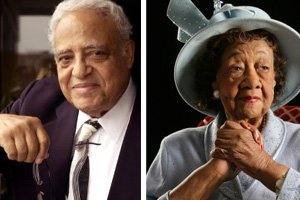 The world is stubborn. It changes its thinking at a glacial pace. People fear change, and they come to hate what they fear. Powerful interests do not want to lose or to share power. The work of social justice, of affecting positive change requires persistent commitment and radical love that gives one the energy to continue the work across decades.
The world is stubborn. It changes its thinking at a glacial pace. People fear change, and they come to hate what they fear. Powerful interests do not want to lose or to share power. The work of social justice, of affecting positive change requires persistent commitment and radical love that gives one the energy to continue the work across decades.
Benjamin Hooks (1925-2010) former executive director of the National Association for the Advancement of Colored People (NAACP) and Dorothy Height (1912-2010), long-time leader of the National Council of Negro Women (NCNW) died recently. Hooks on April 15 and Height on April 20. They were two individuals who challenged a stubborn world and were instrumental in pushing it toward justice.
Dorothy Height began her career as a welfare case worker in New York City. In 1937, at the age of 25, she became a civil rights activist and joined the NCNW. She protested lynching, saying: "if the time is not ripe, ripen the time." She also worked to bring African-American women and European-American women together in dialogue, worked with the YWCA on its One Imperative initiative, an effort to eliminate racism. She was an advisor to presidents, including Dwight Eisenhower and Lyndon Johnson. She had the ear of Eleanor Roosevelt.
She worked with Martin Luther King and others during the civil rights movement of the 1950s and 1960s. She was a member of the National Council for the Protection of Human Subjects of Biomedical and Behavioral Research. It issued a report in response to the Tuskegee Syphilis Study. (This was the study that allowed African-American men to go untreated for syphilis, without their knowledge or consent, in order to study the progression of the disease.) Height was also instrumental in the creation of the Black Family Reunion, an effort to counter negative stereotypes of African-Americans and to counter the media fiction that Black families are disappearing. The United States has honored her life's work with both the Presidential Medal of Freedom and the Congressional Gold Medal.
Benjamin Hooks received a Presidential Medal of Freedom from George W. Bush. During the course of his career, this pastor, preacher, teacher, and lawyer was the first African-American to sit as a judge on the criminal courts in the state of Tennessee. He was the first African-American to serve on the Federal Communication Commission.
He served as executive director of the NAACP during a period of backlash against the civil rights gains of the 1950s and 1960s. He took the helm in 1977 and steered the organization through rough waters of cuts to legal services to the poor, opposition to busing to achieve integration of public schools, rules making it more difficult to prove racial discrimination in employment, political opposition to spending on social programs, and mounting opposition to affirmative action. The NAACP faced the question of relevance, but he increased corporate funding and kept the organization alive to hand to another generation.
I once heard Hooks say: 'The service we give is the rent we pay for the space we occupy." Both he and Dorothy Height paid more than their share of rent. They knew it was their moral responsibility to engage, to pour out their lives with love to make this world a better place. They have earned their rest and left us with a shining example to follow.
 Dr. Valerie Elverton Dixon is an independent scholar who publishes lectures and essays at JustPeaceTheory.com. She received her Ph.D. in religion and society from Temple University and taught Christian ethics at United Theological Seminary and Andover Newton Theological School.
Dr. Valerie Elverton Dixon is an independent scholar who publishes lectures and essays at JustPeaceTheory.com. She received her Ph.D. in religion and society from Temple University and taught Christian ethics at United Theological Seminary and Andover Newton Theological School.
Got something to say about what you're reading? We value your feedback!